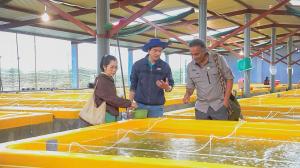
Changing the tide: New project aims to shift attitudes around fish welfare practices
The project – led by Nha Trang University’s Institute for Aquaculture in collaboration with Charles Darwin University (CDU) and Can Tho University’s College of Aquaculture and Fisheries – ultimately aims to reframe farmers’ attitudes around fish welfare, driving better conditions for the animals as well as stronger economic outcomes by identifying areas for improvement.
The project is focused on juvenile pompano – a fish known for its rapid growth and high market value – and surveyed pompano farmers in Vietnam for their knowledge and practices around caring for the animals they rear.
Project collaborator Professor Sunil Kadri, who is the Tropical Aquaculture Group Leader for CDU’s Research Institute for Northern Agriculture (RINA), said the project’s survey would identify what interventions were needed to ensure the farmed fish have a higher quality of life.
“Many sustainability certifications have, until recently, overlooked fish welfare as a major criterion because the science was still developing, they don’t vocalise when in pain or show facial expressions, and we’re obviously more distant from them both in terms of evolution, and physically, because they’re underwater,” he said.
“While this is still a controversial topic, there’s now good evidence to suggest that they feel some type of pain and may be capable of suffering, getting bored, and even depressed – they pass the same tests that we use on mammals to demonstrate emotion and sentience.
“For example, there’s a particular type of fish where experiments have shown that if you give the female fish a male partner they’re not interested in, they become pessimistic.”
Professor Kadri said farmers had a responsibility to improve the quality of life for farmed fish but such obligations also had a financial benefit – principles that could be applied anywhere in the world.
“Welfare concerns for fish are quite controversial, particularly among fishermen because of the questions these may raise over their livelihood," he said.
“But to get the best outcome for their catch, whether that be eating, price or even conservation, minimising stress for the fish under and killing or releasing them quickly is key.
“A well-treated fish will produce a better quality product."
Professor Kadri said the project’s survey stage wrapped up in early March and the team’s findings and recommendations would soon be laid out for industry stakeholders in a report, video, and workshop.
Professor Kadri’s collaborative project aligns with Goals 12, 14, and 17 of the United Nations Sustainable Development Goals, which focus on responsible consumption and production, life below the water, and partnerships.
Raphaella Saroukos
Charles Darwin University
media@cdu.edu.au
Visit us on social media:
Facebook
X
LinkedIn
Instagram
YouTube
Other
Distribution channels: Agriculture, Farming & Forestry Industry, Business & Economy, Environment, Science, World & Regional
Legal Disclaimer:
EIN Presswire provides this news content "as is" without warranty of any kind. We do not accept any responsibility or liability for the accuracy, content, images, videos, licenses, completeness, legality, or reliability of the information contained in this article. If you have any complaints or copyright issues related to this article, kindly contact the author above.
Submit your press release
